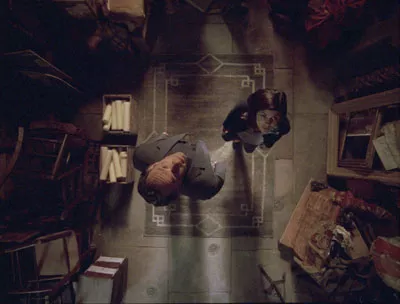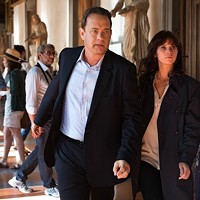
- IS THAT YOU, GOD? Robert Langdon (Tom Hanks) and Sophie Neveu (Audrey Tautou) seek inspiration from above in The Da Vinci Code. (Photo: Columbia)
Oddly, the New York Times never called. Neither did Newsweek. Even our own Charlotte Observer took a pass. The lack of media attention boggled my mind: Surely, someone out there would want to dedicate a couple of lines of copy to my heretofore undisclosed secret?
That's right: I haven't read Dan Brown's novel The Da Vinci Code.
By my calculations, I'm perhaps the only adult in the United States who can make that claim. Heck, I might even be the only mammal able to say that -- even my 19-month-old golden retriever made it to chapter 16 before opting to chew up the remainder of the book rather than continue reading it (a critic in training?). Of course, I considered cramming in a marathon skimming session the weekend before the film screening but finally discarded that course of action. With one notable exception (I felt compelled to find out firsthand what all the Harry Potter hoopla was about), I've never read a book for the sole purpose of being able to compare it to the film version -- since everyone always claims that "the book was better than the movie" (Jaws obviously excepted), that M.O. always struck me as defeatist, as if I were automatically setting the film version up for a fall. At any rate, comparing the written word with the visual image really is a case of comparing apples and oranges (or mangos, or cantaloupes). So, no book. No comparisons. Only a look at the movie as a movie.
Of course, not reading the novel isn't the same as not being aware of the novel -- or the controversy it has generated. It's impossible to climb out of bed in the morning and not be immediately inundated with all things Da Vinci -- it's as ubiquitous as American Idol, the immigration debate and Britney-Spears-as-bad-mama. Brown's mammoth bestseller has been taken seriously enough to inspire a cottage cheese industry of similar "what-if?" Jesus scenarios yet has also been taken frivolously enough to earn scorn as a beach read no better than The Bridges of Madison County.
The movie, on the other hand, has been treated like the stuff of cinematic legend -- at least by its handlers. First, Columbia Pictures decreed that no critic would see the movie until the last possible nanosecond, to better preserve its mysteries and wonders. Then, in a highly unusual move, they decided that the critics should be forbidden from seeing the film together; thus, they arranged for daily newspaper reviewers in each city to see the picture one day earlier than weekly newspaper scribes. No reason was given, though theories have been advanced: 1) Columbia figured mainstream critics would be more charitable than the alternative press and therefore showed them favoritism; 2) the studio was afraid that one disapproving critic would, in 12 Angry Men style, be able to bully his or her colleagues into changing their presumably positive reviews into verdicts of "thumbs down"; and 3) since they boast the largest circulations, the daily writers were given more time to form their (hopefully positive) reviews. Hell if anybody knows the real reason, but these and additional theories are rampant enough to choke a Da Vinci conspiracy blog page.
Of course, it's always possible that all of this busybody activity -- as well as the attempts to shroud the final product in secrecy -- were carefully orchestrated to distract everyone from the simple fact that the film version of The Da Vinci Code (**1/2 out of four) is merely ... OK. It's no instant classic, it won't sweep next year's Oscars, and it won't make its way to the upper echelons of the all-time top-grossing films list. Conversely, it's also not a turkey for the ages -- it won't draw instant titters at the mere mention of its name like, say, Catwoman or The Bonfire of the Vanities. Like Bonfire, however, I suspect that it will be judged far more harshly by those who read the book than those who didn't. After all, on its own cinematic terms, it's a moderately entertaining ride, sort of like the Nicolas Cage hit National Treasure only done with more style and a more respectable cast.
Steered by his Apollo 13 director Ron Howard, Tom Hanks plays the central role of Robert Langdon, a Harvard symbologist whose book-signing stint in Paris is cut short when he's summoned to the Louvre to hopefully shed light on the strange circumstances surrounding the murder of an elderly curator. What Langdon doesn't initially know is that the detective on the case, the gruff Bezu Fache (French national treasure Jean Reno), is convinced that he's the killer. With a police cryptologist named Sophie Neveu (Amelie's Audrey Tautou) as his only ally, Langdon evades capture and begins a jaunt across France and, later, England in an attempt to solve an ancient mystery that, if revealed, could potentially spell the end of Christianity as we know it.
Seeking guidance in their quest, Langdon and Sophie turn to British scholar Leigh Teabing (animated Ian McKellen, easily earning MVP honors) to fill in the missing pieces; all the while, they're being pursued by the homicidal monk Silas (Paul Bettany), the designated hatchet man employed by the corrupt cabal lurking within the bowels of the Catholic Church.
A fellow scribe noted that the film is fairly faithful to its source material, stating that "if you read the book, you know what's going to happen in the movie." Yet therein lies the problem: I didn't read the book and still anticipated what was going to happen in the movie. And I'm not talking about the central earthshaking revelation, which admittedly I knew beforehand; I'm referring to the predictable directions taken by the storyline (the scenarios are startlingly repetitive, each beginning with a code to be cracked and ending with a chase scene) and, more damaging, the obvious twists relating to the identities of the Leigh Teabing and Sophie Neveu characters. In other words, however tantalizingly this might have all played out on the page, up on the screen it simply comes off as one more familiar Hollywood thriller.
Yet where the picture succeeds is within the arena of religious debate. Whatever one thinks of Brown's research and subsequent conclusions, or the worldwide protests of offended Christians (though true believers must know that their religion will far outlive a perceived potboiler that will probably go the way of dinosaurs and Rubik's Cubes), there's no denying that the movie's most gripping scenes involve the laying out of the conspiracy theories. The manner in which Langdon figures out riddles is almost laughable -- he cracks ancient codes in such record time that I half-expected him to pull out and solve a few Sudoku puzzles while he's at it -- yet the resultant discussions, especially when McKellen's Teabing is the one doing the talking, are heady and fascinating. Ironically, these controversial exchanges mark the only time when this rambling picture comes close to being divine.

